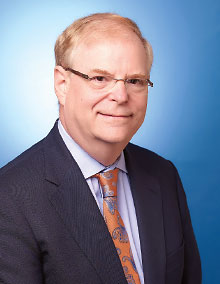A shortage of mental health professionals in the community, especially those trained to treat military veterans for their special needs, is among the obstacles that threaten to undermine the goals of the 2018 Mission Act, which was designed to expand treatment options in the community for veterans.
That’s what psychiatrist Harold Kudler, M.D., representing APA, told lawmakers last month at a special House Committee on Veterans Affairs Roundtable, hosted by Rep. Julia Brownley (D-Calif.) and Chris Pappas (D-N.H.). The roundtable was a “Six Month Check-Up” on the 2018 VA Maintaining Systems and Strengthening Integrated Outside Networks Act (or “Mission Act”). Kudler served as a VA psychiatrist for 31 years and as chief consultant for mental health services for four years at the Veterans Affairs (VA) headquarters in Washington, D.C.
He emphasized that the vision behind the Mission Act is a good one and, if realized, could vastly expand veterans’ access to care. But he urged the administration to back up that vision with the commitment of resources necessary to make it a reality. “The Mission Act creates significant opportunities, but these can be realized only if its implementation targets recognized clinical needs,” Kudler said. “Mental health is paramount among these.”
He noted especially that the VA has maximized prompt access to mental health care by helping to blend mental health services into primary care clinics. “The Mission Act could become a lever for rapidly expanding integrated care across the nation,” he said. “This would be a substantial advance in clinical care not just for veterans but for all Americans.”
A principal goal of the Mission Act is to expand options for care for veterans from health care professionals in the community, outside of the VA system, through the creation of the Veterans Community Care Program. Under the new program, veterans are eligible to seek community-based treatment when there is no VA facility in their state or territory, when the VA does not offer the care that a veteran needs, and when wait times for an appointment exceed 20 days or drive times exceed 30 minutes (
Psychiatric News). But Kudler emphasized that the military is a distinct culture and that VA health care professionals may be specially trained to serve veterans in a way that community providers may not necessarily be.
Citing the 2014 RAND Corporation report “Ready to Serve,” Kudler told the roundtable, “While effective mental health treatment is available, studies by both VA and the RAND Corporation demonstrate that VA providers are significantly more likely to have the necessary military cultural and clinical competence to effectively treat the mental health problems of veterans.”
Moreover, Kudler noted that more than 4.7 million veterans live in rural America, and the vast majority of rural communities are defined as Mental Health Professional Shortage Areas by the Health Services and Resources Administration. That makes finding any mental health professionals—let alone those adequately trained to treat military veterans—difficult or impossible.
Kudler said the following obstacles impact implementation of the Mission Act and realization of its vision:
•
Facilities are having difficulty contracting with a sufficient number of rural mental health professionals, including psychiatrists, for veterans to access mental health care under the Mission Act. This is especially true regarding professionals in the community certified to prescribe buprenorphine.
•
While the VA’s ability to provide telemental health care across state lines as provided by the Mission Act has expanded access, APA has received reports that VA telemental health professionals are often required to manage a high volume of patients within a small window of time. “This can lead to fragmented care, patient dissatisfaction, and professional burnout,” Kudler said.
•
While significant funds have been budgeted for care in the community, some VA facilities report dedicating as many as 100 staff members to implementing and managing the requirements of the Mission Act. “This draws VA staff away from providing care while placing considerable strain on facility budgets,” Kudler said.
•
VA facilities continue to face critical staffing shortages and, in particular, shortages of psychiatrists and mental health professionals.
Kudler highlighted what he called “a critical vulnerability” within the Mission Act: At times of natural disaster, acts of mass violence, or other catastrophic events including any massive influx of new military casualties, it is unclear how the VA could provide a timely, proportionate mental health response. “It can take up to one year to create and implement the needed contracts for care, and there is no provision for fast-track authority,” he said.
Apart from the Mission Act, Kudler also drew special attention to discussions about cutting funding for the Uniformed Services University of the Health Sciences (USU), or even eliminating USU altogether—a prospect that Kudler said could prove especially detrimental to veterans. “VA has been working to create new training slots for psychiatrists who would then repay their scholarship by providing years of VA service, and USU could help provide those slots,” he said. “Furthermore, retiring military psychiatrists join the VA at high rates, demonstrating that both the Department of Defense and the VA enjoy substantial long-term benefits through USU’s unique military training programs.”
Kudler noted that the Mission Act includes funding for training residents to care for veterans. Additionally, the VA’s Education Debt Reduction Program provides reimbursements to employees with qualifying loans who are VA employees enrolled full time in an approved education program.
He said the Trump administration needs to leverage these resources if an adequate mental health workforce at the community level is to be attained.
“Local facility leaders have enhanced options for determining pay and otherwise incentivizing staff recruitment and retention, but not all facilities prioritize utilizing these funds to address mental health staff shortages,” he said. ■

